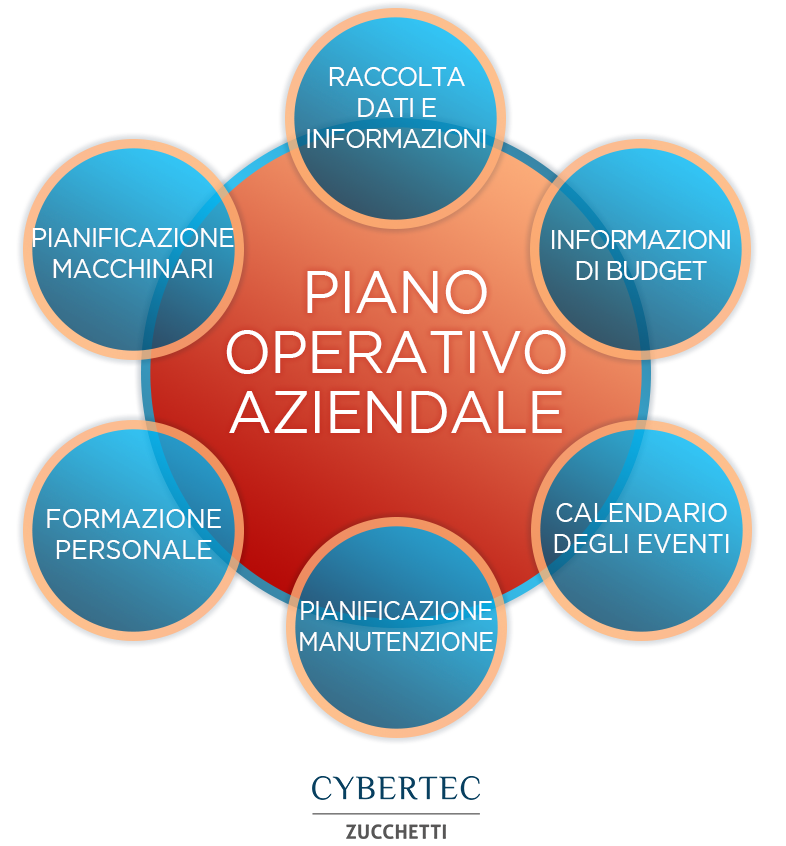In companies we often hear about strategic, tactical and operational planning. In many cases, however, there is confusion regarding the differences that exist between these three types of floors and between the areas common to them. In this article we want to explain what is meant by business operational planning, the purpose for which companies develop a business operational plan and its importance.
Whatis business planning
Business planning is the process through which the company defines the objectives to be achieved and the actions to achieve those objectives. Planning is closely connected to business management, which is the set of processes that contribute to the achievement of the objectives already decided during planning. It is generally divided into 3 processes:
- Strategic planning: this is the company’s long-term mission
- Tactical planning: these are the strategic objectives to be achieved in the medium term
- Operational planning: these are obviously the objectives that you want to achieve in the short term, in the year of activity of the company.
Business operational planning is therefore one of the processes of the broader business planning.
Whatis Business Operational Planning
Operational planning is an essential component of the way of doing business as it explains in detail the steps that the product must take from the design phase to delivery to the customer. An operational plan may seem trivial but it is essential to answer questions such as:
- Where are we now?
- Where do we want to be in the future?
- How do we get there?
- How do we measure progress?
Why strategic planning is important
Strategic planning is important because it explains how we intend to manage and organise the production and delivery of the product. Planning these activities is in fact fundamental and critical for the success of the organization because it translates theory into reality.
The operational plan, then, being an internal programming document, should provide a detailed and in-depth programming of how the activities are intended to be carried out, inserting them into the broader framework of strategic planning. In an operational plan, the clarity and simplicity of the content should be prioritized and before sharing it, it should be verified if the content is clear and if it declines, explaining it, the strategic planning. Some topics that are often addressed in an operational plan are:
- Facilities
- Inventory
- Production or fabrication
- Fulfillment of orders
- Distribution
- Customer Service
- Maintenance and service
In the case of a production plant, for example, it will be important to discuss the process by which products are made. In fact, the production process usually involves a description of the plants, equipment, materials and work needs.
The phases of business operational planning
The business planning process is very delicate and complex so that it can be broken down into linked phases. Each phase is characterized by a time horizon that narrows more and more. In addition, moving from one phase to another, the details relating to the definition of objectives and the means to achieve them increase. For this reason, he talks about:
- Strategic planning: translates the company mission
- in strategic objectives to be achieved in the long term. It is important because it defines the future of the company itself and guides all its work;
- Tactical planning: strategic objectives are “translated” into concrete actions to be carried out within a certain period of time, usually from 3 to 5 years;
- Operational planning: in turn, tactical objectives are converted into operational objectives, i.e. objectives to be achieved within a short period through a series of strategic actions. Usually this period well includes a year of work.
 Business operational planning in turn is divided into several phases, namely:
Business operational planning in turn is divided into several phases, namely:
- Identification of problems and opportunities;
- Inventory and forecast conditions;
- Formulation of alternative plans;
- Evaluation of alternative plans;
- Comparison of alternative plans;
- Selecting a plan.
It is important to underline the iterative nature of this process. As more information is gained, you may need to reiterate some of the above steps. The six steps, although presented and discussed sequentially for ease of understanding, usually occur iteratively and sometimes simultaneously. Phase iterations are conducted as needed to formulate efficient, effective, complete, and acceptable plans.
The benefits of business operational planning
It is useful to dedicate time to the correct evaluation of your processes to study whether it is possible to improve their efficiency and improve the quality of the finished product. By doing these reasonsing, it will be possible to identify gaps that, once resolved, allow you to increase profit margins. Focusing on an operational plan can also lead to these advantages.
Differences between operational and strategic planning
Companies often use the expressions strategic planning and operational planning to identify the same thing, but if the strategic plan also acts as an operational plan, this is not so good and there are probably problems. However, both are necessary to achieve the objectives.
Whatis a strategic plan?
A strategic plan defines the company‘s mission, vision and high-level objectives for the next three to five years. In addition, it takes into account how to measure these objectives and the main projects you intend to undertake to achieve them.
Whatis an operational plan?
An operational plan (or work plan) is a detailed outline of what the company will do in the near future, usually the following year. The plan will answer questions (such as: who, what, when and how much) regarding daily or weekly activities. In particular, it defines:
- What: The strategies and tasks to be achieved and completed;
- Who: The people who are responsible for each activity strategy and activity;
- When: The timeline for which the strategies and activities must be completed;
- How much: The financial resources available to complete a strategy/activity.
In a nutshell, the strategic plan shares the vision for the future, while the operational plan defines how the vision is to be achieved, in a concrete way, by defining actions on a daily or weekly basis. Both concepts therefore describe business plans for the future, but in different contexts. Below we have identified four main differences between them:
- Timeframe : The strategic plan outlines the long-term goals for the next three to five years. The operational plan outlines what will be done to achieve these goals in the near term.
- Objective: The objective of the strategic plan is to outline the long-term vision of the company and the way in which all departments collaborate to achieve it. The focus of the operational plan is not on the company, but on the department. There may be overlap between departments, but this is the exception rather than the rule. Large departments may require more than one operational plan.
- Plan Generation: Your organization’s leadership team, such as the executive team or board of directors, is responsible for creating the strategic plan. Once created, the strategic plan will be carried out by cross-functional teams that cooperate to ensure the strategy is successful. Each department should have figures responsible for creating its own operational plan. In addition, although each operational plan is designed for a single department, its proper implementation will lead to success at the enterprise level.
- Budget: The budget for the strategic plan comes from the strategic budget, not the operational budget. The budget for the operational plan comes from the department’s annual budget.
There are therefore obvious differences between the two types of planning such that the two plans cannot coincide in any way.
The software for business operational planning
Companies, and in particular manufacturers, can now use extremely advanced software solutions that can support them in the decision-making process. Business operational planning also benefits from IT solutions, and in particular Advanced Planning and Scheduling software allow managers of the production department to have a precise and up-to-date vision of the near future. Planners, Supply Chain managers and department managers can use these tools to organise the central department of a manufacturing company, the production department.
Learn how to best manage your production department and in particular its planning
Today, manufacturing companies can enjoy the competitive advantage offered by software for production planning and scheduling. Software that integrates perfectly with management systems (such as Zucchetti, Oracle and SAP), dialoguing with them and exchanging accurate, timely and up-to-date data. Contact a Supply Chain expert, express your doubts and get the best advice from a company with over thirtyyears of experience, part of the largest Italian group in the sector.
